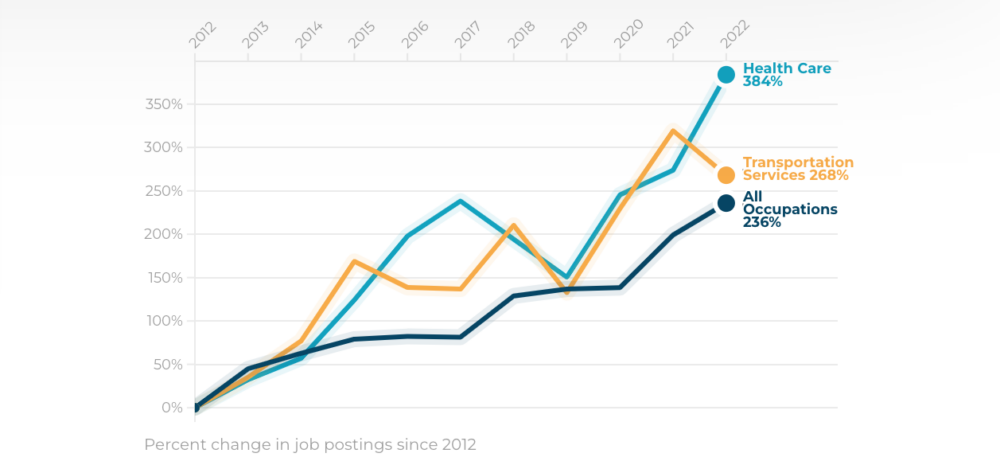

, Workforce & Economic Mobility
Key Takeaway
Employers across the country are grappling with the challenge of filling critical job openings in industries like health care and transportation services. Explore our series of data visualizations to learn more about these in-demand occupations and whether your business could be a good candidate for Talent Finance.
Talent Finance is an emerging, employer-led approach to talent development that prepares workers for the jobs that employers need to fill. Talent Finance bridges the gap between employers, training partners, supportive service providers, and funders—enabling employers to collaborate on self-sustaining talent programs to finance, train, hire, and retain diverse talent. To better understand the Talent Finance landscape, we conducted an analysis on the current U.S. labor market:
The U.S. labor market is tight. Though dynamics may be starting to shift, there are around two jobs for every jobseeker right now, creating a challenging environment for employers to reliably meet their talent needs using traditional talent acquisition strategies.
But for jobs that pay a living wage and don’t require a four-year degree, Talent Finance can be an effective strategy for employers to broaden their talent pipelines and reach new workers ready to be upskilled.
So, what kinds of occupations have the greatest potential for success with Talent Finance? Based on 2022 job posting data, we identified the top 10 occupations that are best-primed for Talent Finance. Although these occupations are concentrated in health care and transportation services, opportunities to implement Talent Finance exist across the entire economy.
Since demand for health care and transportation services workers has been growing faster than jobs on average over the last decade, employers in these industries that continue to rely on traditional talent acquisition strategies are likely to face an even tighter market moving forward. That’s where Talent Finance can make a difference.
Employers across the country are grappling with the challenge of filling critical entry-level job openings. If you are hiring for these types of positions and want to explore whether your business could use Talent Finance, we want to hear from you.
To learn more about Talent Finance, watch this video or download this report.
The research included on this page was made possible through funding by Walmart. The findings, conclusions and recommendations presented are those of the authors alone, and do not necessarily reflect the opinions of Walmart.
(1) (A) Per BLS Table A-4, 43% of unemployed Americans over the age of 25 have less than an Associate’s degree. This filter is applied to conservatively approximate the share of unemployed Americans that make up Talent-Finance-Ready Workers.
(B) Per Third Way’s findings, 70% of American jobs pay at least a living wage. C.) Per BLS, about 10% of open jobs require more education than a high school diploma but less than a Bachelor’s degree. These two filters are applied to conservatively approximate the share of open jobs that are Talent Finance Ready.
(2) (A) Inclusion in these 10 Talent Finance Fit Standard Occupation Classification (SOC) code occupations is determined by each occupation’s educational requirements (requiring more formal training than a high school degree but less than a Bachelor’s degree), median annual wage (above $40,000), and number of job postings in 2022.
(B) Number of online job postings per SOC occupation are from Lightcast Job Posting Analytics.
(3) (A) Occupations are mapped to industries as follows:
– Health Care: Registered nurses, LPNs and LVNs, Clinical Laboratory Technologists and Technicians, Physical Therapists, Surgical Technologists, Medical Records Specialists, Occupational Therapists, Radiologic Technologists and Technicians, Dental Assistants.
– Transportation Services: Heavy and Tractor-Trailer Truck Driver, Automotive Service Technicians and Mechanics, Bus and Truck Mechanics and Diesel Engine Specialists.
– [Not Pictured in Graphic] Other Industries: Computer User Support Specialists, HVAC Mechanics and Installers.
(B) Number of online job posts generated using Lightcast Job Posting Analytics.
Related Insight

Thinking Like a Talent Investor
With employers across the country facing critical talent shortages, companies are exploring new ways to upskill and reskill workers. This report illustrates how, with intentional design and an “investor” mentality, employers can deploy Talent Finance…

Video: Talent Finance
Talent Finance bridges the gap between employers, training partners, supportive service providers, and capital providers, enabling them to collaborate on self-sustaining talent programs that prepare workers for the specific jobs employers need filled.

New Strategies for Employer-Led Workforce Development
We believe employers can and should engage more deeply in innovative solutions to today’s talent challenges. That’s why Social Finance is working to identify effective and underutilized opportunities for employers to finance, train, hire, and…